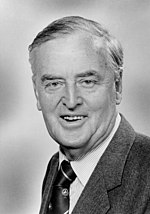Joh Bjelke-Petersen, Date of Birth, Place of Birth, Date of Death
TweetJoh Bjelke-Petersen
Australian politicianAbout Joh Bjelke-Petersen
- Sir Johannes Bjelke-Petersen, (13 January 1911 – 23 April 2005) was an Australian politician.
- He was the longest-serving and longest-lived Premier of Queensland, holding office from 1968 to 1987, during which time the state underwent considerable economic development.
- His uncompromising conservatism (including his role in the downfall of the Whitlam federal government), his political longevity, and his leadership of a government that, in its later years, was revealed to be institutionally corrupt, made him one of the best-known and most controversial political figures of 20th century Australia. Bjelke-Petersen's Country (later National) Party controlled Queensland despite consistently receiving the smallest number of votes out of the state's leading three parties, achieving the result through a notorious system of electoral malapportionment that resulted in rural votes having a greater value than those cast in city electorates.
- The effect earned Bjelke-Petersen the nickname of "the Hillbilly Dictator".
- Yet he was a highly popular figure among conservative voters and over the course of his 19 years as premier he tripled the number of people who voted for his party and doubled the party's percentage vote.
- After the Liberals pulled out of the government in 1983, Bjelke-Petersen reduced his former coalition partners to a mere six seats in an election held later that year.
- In 1985 Bjelke-Petersen launched a campaign to move into federal politics to become prime minister, though the campaign was eventually aborted. Bjelke-Petersen was a divisive premier and earned himself a reputation as a "law and order" politician with his repeated use of police force against street demonstrators and strongarm tactics with trade unions, leading to frequent descriptions of Queensland under his leadership as a police state.
- From 1987 his administration came under the scrutiny of a royal commission into police corruption and its links with state government ministers.
- Bjelke-Petersen was unable to recover from the series of damaging findings and after initially resisting a party vote that replaced him as leader, resigned from politics on 1 December 1987.
- Two of his state ministers, as well as the police commissioner Bjelke-Petersen had appointed and later knighted, were jailed for corruption offences and in 1991 Bjelke-Petersen, too, was tried for perjury over his evidence to the royal commission; the jury failed to reach a verdict and Bjelke-Petersen was deemed too old to face a second trial.
Read more at Wikipedia
See Also
- Famous People's Birthdays on 13 January, New Zealand
- Famous People's Birthdays in January, New Zealand
- Famous People's Birthdays on 13 January, Australia
- Famous People's Birthdays in January, Australia
- Famous politician's Birthdays on 13 January, New Zealand
- Famous politician's Birthdays in January, New Zealand
- Famous politician's Birthdays on 13 January, Australia
- Famous politician's Birthdays in January, Australia


 Date of Birth:
Date of Birth:  Place of Birth: Dannevirke, Manawatu-Wanganui Region, New Zealand
Place of Birth: Dannevirke, Manawatu-Wanganui Region, New Zealand